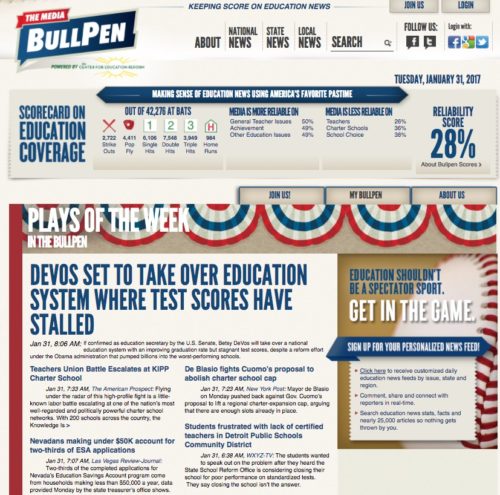
BREAKING: Constitutional law experts led by former Solicitor General of the United States Paul Clement have determined that the Kentucky state constitution does not in any way prohibit enactment of a strong charter school law.
The report “is great news for the cause of parent power in Kentucky,” says Jeanne Allen, the founder and CEO of the Center for Education Reform. “There’s no need to water down the law or undermine the core principles of charter schooling to address a non-existent conflict with the state constitution. And there’s no reason that the legislation cannot move forward.”
The Bluegrass State remains one of seven states that have not passed charter school legislation. With more and more nationally-reputable researchers and reports indicating charters’ consistent success and efficacy in boosting student achievement across the board, it is becoming increasingly difficult to ignore demand for the schools, and the regressive policies holding Kentucky lawmakers back from passing charter legislation.
![]()
Kentucky’s charter law is new but weak. See why it scores so low:
Kentucky Earns a ‘D’ in CER’s 2018 Charter School Law Rankings & Scorecard
![]()
In an interview earlier this year, CER Founder and CEO Jeanne Allen said that Kentucky’s Charter School Law does a disservice to Kentucky families:
![]()
- There are more than 6,800 charter schools serving nearly 3 million children across the country. Read more…
- Charter schools across the United States are funded at 64 percent of their district counterparts. Read more…
- There is a direct correlation between strong laws and successful charter schools. Read more…
- Do bad charter schools close? You bet, by a percent larger than any other schooling sector. Read more….
![]()
Just the FAQs: Charter Schools
Here, you can find answers to frequently asked questions regarding charter schools and what they mean for students, educators, schools and communities
![]()
Charters Can Put Kentucky in Education Super Bowl
“Advocates of school choice in Kentucky have struggled and persisted in their efforts to enact a charter school law. For the sake of the children, we hope they win.
“Myths and misconceptions have kept Kentucky one of only seven states still denying its most needy students access to the choice of a public charter school. Unfounded arguments often deter lawmakers from taking the bold step of reforming their public school system, a monopoly that challenges its teachers, staffs and students.
![]()
New Report on Charter Schools Offers Best Evidence to Date of Their Impact
“Despite their proven success, many opponents across the nation continue to advance myths about charter schools at the expense of kids.
“There is a myth that charter schools somehow take resources away from local public schools. …despite money following children, in most states charter schools… are forced to do more with less.
![]()
Just the Facts: Success, Innovation, and Opportunity in Charter Schools
Only 28 percent of Kentucky’s 8th-grade students score proficient in math on the latest national assessment. Only 36 percent were proficient in reading. Fewer than 33 percent of Kentucky residents finish high school and go on to earn a two or four-year higher education degree.
More from the Courier-Journal:
“Once empowered with choices, families show their preference for schools that fit their needs best by switching to a charter school that simply offers them a better opportunity to learn.”
“Charter schools can help lure new investment and philanthropy to the state, and provide a better environment for youth to learn, prosper, and stay in the state. …the future of our children is not a game and losing cannot be an option.”
![]()
Kentucky has a rich history of wanting to improve how it serves students. As it considers charter legislation it could break the mold by ensuring 100% educational equity for all students.
In Public Charter School Legislation and the Kentucky Constitution, Paul D. Clement summarizes,
“Whatever obstacles to the creation of charter schools may exist, the Kentucky Constitution should not be one of them.”
Download Clement’s white paper here.
![]()
The 2008 policy report Fears vs. Facts About School Choice, by John Garen, Ph.D. and the Bluegrass Institute, further confirms these truths and debunks claims of charters’ ill-effects, saying,
“School-choice reform brings competition and market-based incentives into primary and secondary education. Americans rely heavily on free and competitive markets for most goods and services and it generally works quite well. But education leaders and lawmakers balk at allowing them to work in public schools.
“The considerable dissatisfaction with public schools warrants adopting this alternative approach. Many states already have moved in this direction; unfortunately, Kentucky has not.
“Establishing charter schools would represent an important step toward embracing a system with market incentives. Charter schools are elementary and secondary schools that are publicly funded but operate without many of the regulations that can limit the effectiveness of traditional public schools. Charter schools are founded by different entities, including teachers, parents and universities.
“Charter schools do not “skim the cream” but enroll a diverse student population. They induce better performance from nearby traditional public schools while providing schooling services in response to parents’ unique demands. Finally, charter schools and vouchers perform well regarding student outcomes. Outside Kentucky, charter schools and voucher systems have become increasingly common and represent good policies opportunities for Kentucky.
Momentum is truly building for new opportunities for students in the Bluegrass State with a new governor, a choice-friendly House, and Kentucky lawmakers visiting DC charter schools earlier this year.


















